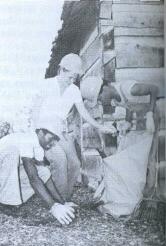By GREG MANSFIELD
YACC:
A lot of jobs for unemployed youth
A NEW federal program will provide over 500 full-time jobs for unemployed young people in Illinois. The Young Adult Conservation Corps (YACC) program has received federal approval of a $3,351,000 grant, according to Gov. James R. Thompson. Eligible for participation in the program are any unemployed persons, age 18-23. Participants will work on conservation projects in public lands and waters and need no prior experience to apply. Modeled after depression-era Civilian Conservation Corps, the program's major goal is to reach all 102 counties providing worthwhile jobs for unemployed young men and women in each area. Persons hired in the program can participate for up to 12 months. Enrollees will be permitted to work a standard 40-hour week and will be paid the current federal minimum wage. Work crews will consists of 10 to 60 individuals based at each camp site. All but one of the sites will require the youths to commute daily from their homes. One southern Illinois site will provide housing so that the youths can live at the site. "The YACC program will provide training for young people with minimal job skills or experience," said Scott Fisher, program administrator. In addition to the work experience the youths will gain, Fisher said they will also have the chance to participate in other educational and vocational opportunities provided by other state agencies. "I think this program has tremendous potential for Illinois," said Fisher. "Not only will the enrollees benefit, but we will be providing private industry with new job applicants who already know "how to work. The public will enjoy the increased facilities at most of our state parks and forests." The main goal of the program is to employ at least 800 young adults by the end of August 1979 in new projects that will permanently improve recreational and conservational areas throughout the state. Illinois has received funding for six YACC camp sites located in the following state parks: Rock Cut in Winnebego County, Jubilee College in Peoria County, Kankakee in Kankakee County, Sangamon County Conservation Area (at the State Fairgrounds), Pere Marquette in Jersey County and the Trail of Tears in Union County. These sites were selected so that youths from every area of the state would be close to one of the sites. Some of the projects planned for the next few months are clearing and developing four acres of picnic grounds in Springfield, renovating historic sites near Peoria, reworking two miles of shoreline near Rockford, creating 15 miles of fire lanes in the Trail of Tears state forest, and designing and building goose and duck blinds in southern Illinois. In general, projects include cleaning up rivers and lakes, planting trees, learning flood control methods, planning wildlife habitat improvement and providing recreation and conservation areas with emergency aid in the event of natural disasters. Local communities needing renovation work and lacking the manpower to do it may submit applications to the YACC. If approved, the community would provide the materials, and the YACC would provide the manpower. The federal YACC program was set up to last for three years and will expire on October 1,1980. At that time, consideration for program renewal will be based on a congressional review of its performance. First year funding for the Illinois program ends April 1, 1979, but second year funding has already been applied for. Jobs in the YACC will he open to men and women of all racial, social, ethnic and economic backgrounds, but priority will be given to areas with high levels of youth unemployment. All persons interested in applying for positions should contact either the Illinois State Employment Agency, which is the program liaison, or the Young Adult Conservation Corps, 100 Alzina Building, 100 N. First Street, Springfield Ill. 6270l. 32/July 1978/Illinois Issues
|
||||||||||||||||

